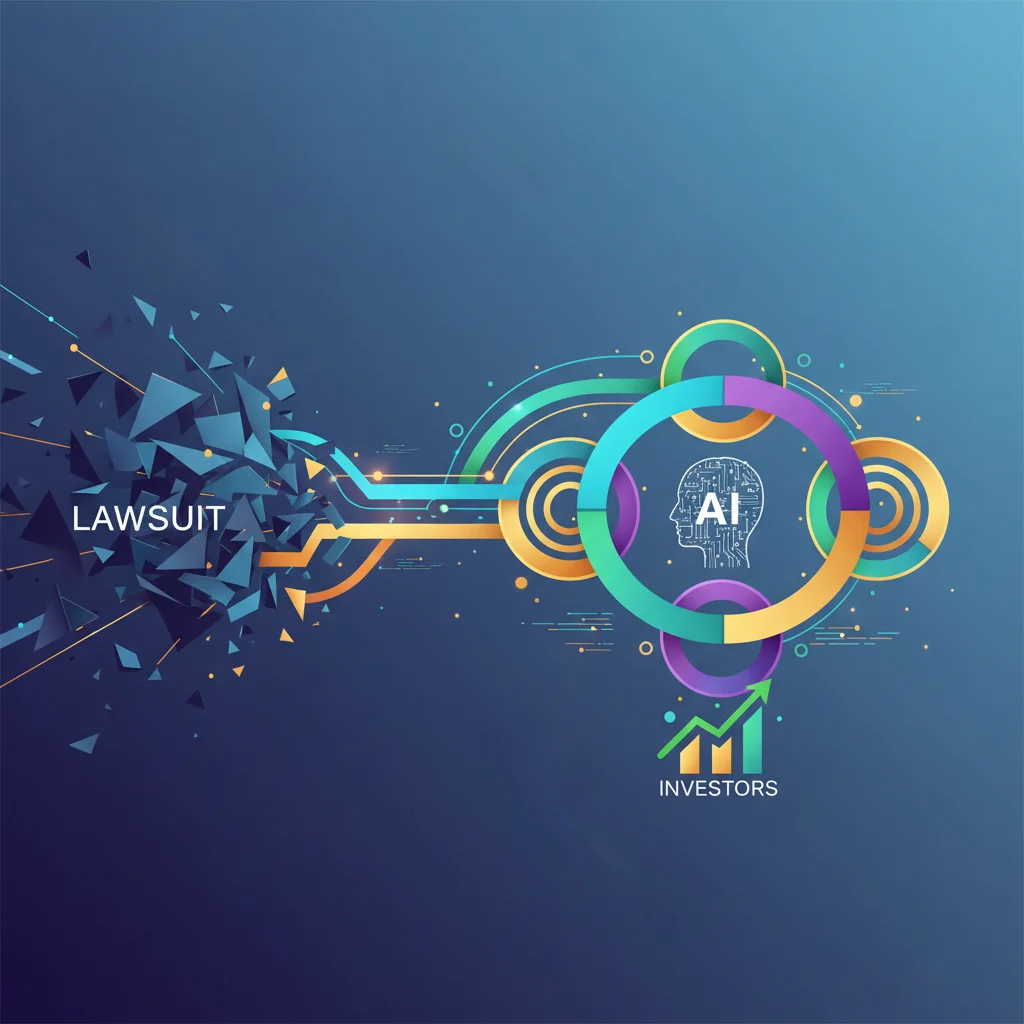
From Lawsuit to Alliance: Why Warner Music’s Bold Bet on AI is a Game-Changer for Investors
A Surprising Harmony: The Lawsuit That Became a Partnership
In a move that sent ripples across the music, technology, and finance sectors, Warner Music Group (WMG) has orchestrated one of the most unexpected strategic pivots in recent memory. After being part of a sweeping industry lawsuit against generative AI music startup Suno for alleged mass copyright infringement, Warner has not only settled its dispute but has entered into a strategic joint venture with the very company it was taking to court. This decision, announced in late 2024, marks a pivotal moment, transforming a potential industry-wide legal war into a landmark collaboration. For investors, business leaders, and anyone tracking the intersection of financial technology and creative industries, this is more than just a headline; it’s a critical signal about the future of intellectual property, corporate strategy, and the evolving digital economy.
The initial conflict was a classic tale of disruption versus incumbency. In June 2024, the Recording Industry Association of America (RIAA), on behalf of major labels including Warner Music, Sony Music Entertainment, and Universal Music Group, filed lawsuits against AI music generators Suno and Udio. The core allegation was that these platforms had trained their AI models on a vast, unauthorized library of copyrighted sound recordings, effectively building their innovative technology on the back of stolen intellectual property. The lawsuit sought damages of up to $150,000 per infringed work, a figure that could have reached astronomical sums, posing an existential threat to the burgeoning AI firms. This legal battle was seen as the music industry’s definitive stand against the unchecked proliferation of generative AI. That is, until Warner broke rank.
Deconstructing the Deal: From Litigation to Innovation
The joint venture between Warner Music and Suno is designed to co-develop AI-powered music creation tools. The collaboration aims to leverage Suno’s powerful technology to create new music with Warner’s roster of superstar artists and songwriters, who will reportedly have the option to engage with the tools. Robert Kyncl, CEO of Warner Music Group, framed the partnership as a move to empower human creativity, stating, “AI will enable artists to realize their visions, as well as to democratize music creation for fans.” (source). Mikey Shulman, co-founder and CEO of Suno, echoed this sentiment, emphasizing a future where AI and human artists collaborate to create “a new wave of music.”
This pivot from litigation to collaboration is a masterclass in corporate strategy. Rather than fighting an expensive, protracted, and potentially losing battle against an inevitable technological shift, Warner has chosen to embrace it on its own terms. This allows the label to:
- Shape the Technology: By partnering with a leading player, WMG can influence the development of AI tools to ensure they align with artist interests and copyright principles.
- Establish New Revenue Streams: The partnership opens doors to new licensing models, fan engagement tools, and potentially a new category of AI-assisted musical works, diversifying its income in an already competitive market.
- Gain a First-Mover Advantage: While other labels remain in a purely adversarial stance, Warner positions itself as a forward-thinking innovator, potentially attracting tech-savvy artists and creating a competitive edge.
For investors monitoring WMG’s performance on the stock market, this move signals a proactive, rather than reactive, approach to disruption. It suggests leadership is not just protecting existing assets but actively seeking growth in a landscape being reshaped by artificial intelligence. This strategic foresight is a key indicator for long-term investing.
The Financial and Economic Implications of AI in Music
The Warner-Suno deal is a microcosm of a much larger economic transformation. The integration of generative AI into creative industries raises profound questions for finance professionals and economists. The traditional models of valuation, royalty collection, and intellectual property rights are being challenged, creating both immense risks and opportunities.
Consider the impact on the banking and investment sectors that finance the entertainment industry. Valuations for music catalogs, a hot asset class in recent years, may need to be reassessed. Does the potential for infinite, high-quality AI-generated music devalue existing human-created catalogs? Or does the “human-made” label become a premium signifier, increasing their value? This partnership suggests a hybrid future, where the value lies in the synergy between human artistry and AI capability.
Furthermore, this alliance highlights the critical role of fintech in solving the industry’s next great challenge: tracking and monetizing AI-generated content. How are royalties distributed when an AI tool, trained on thousands of artists, contributes to a new hit song? This is where technologies like blockchain could become indispensable. A transparent, immutable ledger could meticulously track every musical element, every data point used in the AI’s training, and every new creation, automating complex royalty splits with unprecedented accuracy. This represents a massive opportunity for financial technology firms to build the back-end infrastructure for the next era of the creative economy.
A Strategic Analysis: Pros and Cons of the Alliance
For both Warner Music Group and Suno, this partnership presents a complex tapestry of benefits and potential pitfalls. Understanding this balance is crucial for assessing its long-term viability and impact on the broader market. Here is a breakdown of the strategic calculus for each party:
| Stakeholder | Potential Advantages (Pros) | Potential Disadvantages (Cons) |
|---|---|---|
| Warner Music Group (WMG) | Gains influence over a key disruptive technology. Creates new revenue models and first-mover advantage. Resolves costly and uncertain litigation. Enhances its image as a technology-forward company. | Potential for artist backlash and mistrust. Risks devaluing its own human-created catalog. The technology could eventually become a competitor. Reputational risk if the AI is used unethically. |
| Suno AI | Gains legitimacy and industry validation. Resolves a potentially company-ending lawsuit. Access to WMG’s world-class artists and catalog for ethical training and collaboration. Secures a powerful distribution partner. | May be seen as “selling out” by the open-source AI community. The partnership could impose creative or technological limitations. Potential for dependency on a single major industry partner. |
This table illustrates the high-stakes nature of the venture. While the upside is significant, the risks associated with cannibalizing existing business models and managing artist relations are very real. The success of this partnership will depend heavily on execution and the establishment of a governance model that is perceived as fair by the creative community.
The Millionaire's Gambit: Why the Super-Rich Are Demanding to Pay More Tax
The Road Ahead: Navigating the New Frontier of Creativity and Commerce
The Warner-Suno alliance is more than a business deal; it’s a foundational event that will likely set the precedent for how the entire creative industry engages with artificial intelligence. Other major labels, currently continuing their legal battles, are now faced with a strategic dilemma. Do they continue to fight, potentially isolating themselves from the technology’s evolution, or do they follow Warner’s lead and seek their own partnerships? According to a report on music industry trends, generative AI is expected to contribute billions to the industry’s value by 2030 (source), making inaction a risky strategy in itself.
From an economics perspective, this signals a shift from a model of scarcity (a limited number of artists producing hits) to one of abundance (potentially infinite content generation). The new challenge for businesses will be curation, branding, and creating authentic connections between audiences and creators—whether human, AI, or a hybrid of the two. The principles of trading and asset valuation will need to adapt as intellectual property becomes more fluid and collaborative.
For the broader investment community, this story serves as a powerful case study in navigating technological disruption. Companies that can successfully transition from a defensive crouch to a proactive, strategic embrace of new technologies are the ones most likely to thrive. Warner Music Group’s bold move, while fraught with risk, demonstrates a willingness to write the rules of the next chapter rather than simply be written out of it. The harmony they find with Suno—or the discord that may arise—will be a tune that the entire market will be listening to for years to come.
The Cold Truth: Why Fuel Poverty is a Critical Economic Indicator for Investors and Leaders
Ultimately, the settlement and joint venture represent a pragmatic compromise. Suno gets the legal clearance and industry access it needs to survive and scale, while Warner gains a strategic foothold in a technology that could redefine music creation and consumption. This is not the end of the debate over AI and copyright, but it is the beginning of a new, more integrated and complex relationship—one where the lines between creator and tool, art and algorithm, and threat and opportunity are becoming increasingly blurred.

